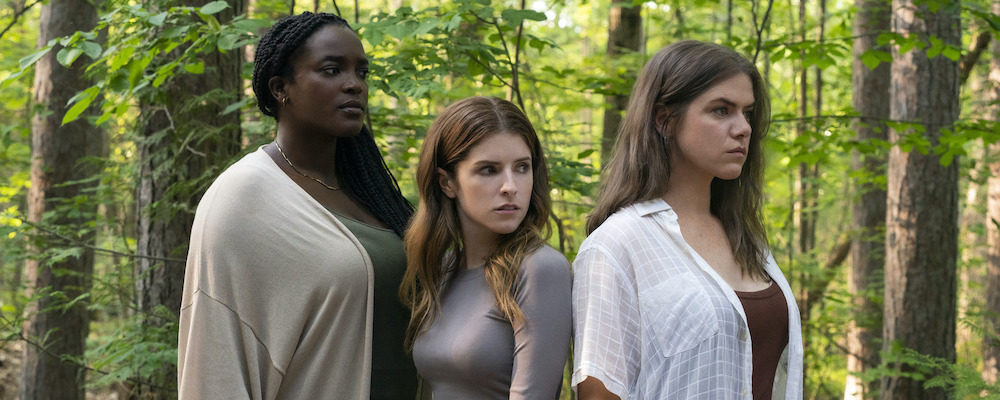In ‘Alice, Darling,’ Anna Kendrick Captures a Shattering Portrait of Domestic Abuse
Alci Rengifo
Films can be a curious thing where strong performances and a sense of purpose overcome a sparse screenplay. Take “Alice, Darling” for example. It’s a movie where any sense of a “plot” dissipates. More prominent are the characters, places and an overall study of how emotional abuse can take a psychological, even physical toll. Director Mary Nighy has mostly done TV and short films, and it’s easy to see her skill for economic filmmaking. What she doesn’t pull off with action is made up for by Anna Kendrick, who plays a woman battling to hide the inner turmoil of being cornered in a toxic relationship. Such a situation can turn even mundane activities into pure claustrophobia, and at heart that is the true theme of this movie.
Kendrick is the Alice of the title, a professional who is best friends with Sophie (Wunmi Mosaku) and Tess (Kaniehtiio Horn). It is going to be Tess’s 30th birthday and to celebrate the trio will head out for a cabin getaway in the woods. Alice is currently dating Simon (Charlie Carrick), a slightly older artist who is feeling the frustration of a slagging career. He is also a control freak who has such a hold on his girlfriend that she practices what to say in front of the bathroom mirror. Alice even lies to him about the birthday getaway and all seems fine for a while, until he starts texting and texting. Her obvious stress and a potential eating disorder set off alarms in her friends, who try to lend support even if lingering resentments threaten to boil over.
The screenplay, by Alanna Francis, works so well in moments purely about Alice’s inner state that we can overlook some of the bad relationship clichés. Does Simon really have to be a frustrated artist? He could just as well be a neurotic car salesman. Yet, never does Nighy turn the material into a bombastic thriller like “Sleeping With the Enemy.” It’s a self-contained drama about people and how, through observations, we tend to realize what might actually be happening to someone. Sophie and Tess try to tell Alice that her behavior regarding Simon is rather odd, especially in having to lie about where she is going. Most people hate having to hear the truth and this can provoke sudden snaps from Alice toward Tess, herself an aspiring artist, jealous over Simon’s greater recognition. “Alice, Darling” has many moments that work because of the psychology involved.
For Anna Kendrick, this film also works as a strong showcase of her potential for darker material. She has been in some good dramas and comedies over the years, but has never had a meltdown like the one we witness in this film. Her twitching, perspiring performance is all about capturing that asphyxiated state of being entrapped. A word can trigger an episode and the moment Simon enters a room she looks more like a prisoner ready for the warden. The feeling of empathy she generates is stronger because the material avoids finding some definite answer to why Alice has fallen into this relationship. Simon is handsome but also a bit of a bore. He’s that kind of perfectionist snob who channels his delusions of superiority into controlling Alice. How she eats, dresses, moves, are all potential points for him to give a cruel note. Such relationships can become anchors of habit, chaining someone before they even realize it. Wunmi Mosaku and Kaniehtiio Horn are vivid and wholly convincing as the two friends who, along with Alice, know each other to the point of predicting behaviors from a glance.
The crescendo that “Alice, Darling” builds to is unique and might even get labeled “anti-climactic.” It’s true, this film doesn’t arrive at the sort of typically riveting conclusion of countless thrillers or message dramas, but it’s also a realistic resolution. At its strongest, “Alice, Darling” is a portrait of a damaged psyche. Alice can’t even enjoy a day out on the lake with Tess because of lingering tensions that all link back to Simon. He’s like a shadow that is always following her. His texts are not written like angry harassment notices. They are dangerously pleading for her to give him attention. In another scene, the beginnings of lovemaking turn into an awkward, sad example of how Alice has been worn down by this man, to the point of not feeling anything. Kept within one location and with good actors, Nighy’s film is brisk but not empty. The plot may not be astonishing, yet the psychological factors and emotional tension at play are, on their own, very effective.
“Alice, Darling” releases Jan. 20 in select theaters.

